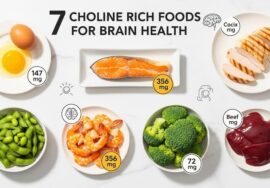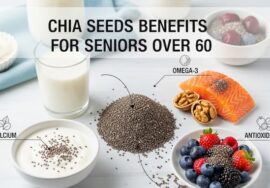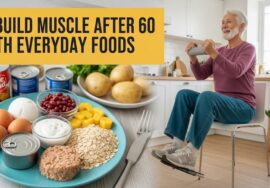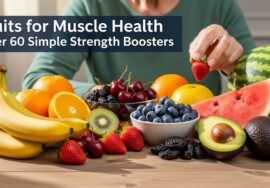If you’re over 60 and feel your legs or arms aren’t as strong as they used to be, you’re not imagining it. Muscle loss, also called sarcopenia, is common with age — but here’s the good news: what you eat can slow it down. And yes, one simple food can make a big difference.
Table of Contents
- Why Muscle Loss Speeds Up After 60
- The One Food That Helps Most
- Why Protein Matters More After 60
- Other Muscle-Friendly Foods to Add
- Simple Ways to Eat More Muscle-Building Foods
- Quick Q&A
Why Muscle Loss Speeds Up After 60
Muscles naturally get smaller with age because the body produces less protein for repair. Hormonal changes, lower activity levels, and eating less protein than you need all make it worse. The result? Weak legs, poor balance, and sometimes trouble doing simple daily things.
The One Food That Helps Most
Eggs.
Yes, something as simple as an egg is one of the best muscle-preserving foods for seniors. Eggs are packed with high-quality protein, which your muscles need to repair and grow. They also contain leucine, an amino acid proven to help prevent age-related muscle loss.
And they’re easy to add to your day — scrambled, boiled, or even in a simple omelet with vegetables.
Why Protein Matters More After 60
1. Prevents Muscle Shrinking
The older you get, the more protein your muscles need. Without enough, the body starts breaking down muscle for energy.
2. Helps Maintain Balance and Strength
Weak muscles increase the risk of falls. Stronger muscles mean better stability, especially for legs and core.
3. Supports Faster Recovery
Whether you garden, take daily walks, or do light exercise, protein helps muscles recover and stay firm.
Other Muscle-Friendly Foods to Add
While eggs are a star, variety matters too:
- Greek yogurt – Rich in protein and easy to digest.
- Beans and lentils – Great plant-based option.
- Salmon or tuna – High in protein and omega-3s to support muscle repair.
- Almonds and pumpkin seeds – Magnesium for muscle relaxation and recovery.
Simple Ways to Eat More Muscle-Building Foods
- Start breakfast with one or two eggs instead of just toast.
- Add a spoon of Greek yogurt as a snack.
- Swap processed snacks for nuts or seeds.
- Make beans or lentils a side dish at lunch or dinner.
✅ Quick Q&A
1. Why do seniors lose muscle after 60?
Because the body slows protein production, and many eat too little protein to maintain muscle.
2. Can eating eggs really help stop muscle loss?
Yes, eggs provide high-quality protein and leucine, which help preserve muscle mass.
3. How many eggs should seniors eat daily?
One or two eggs a day is generally safe, but ask your doctor if you have cholesterol concerns.
4. What other foods help stop muscle loss?
Greek yogurt, beans, salmon, and almonds all support muscle health.
5. Is exercise still needed if you eat enough protein?
Yes, light strength exercises work with protein to keep muscles strong.
6. Can low magnesium cause weak muscles?
Yes, magnesium supports muscle relaxation and recovery, so add seeds and leafy greens.
7. Should seniors eat more protein than younger adults?
Yes, older adults need slightly more protein to prevent muscle shrinking.
8. Are plant proteins as good as animal proteins?
Yes, but you may need to eat a mix (beans, lentils, nuts) to get all essential amino acids.
9. Can skipping meals speed up muscle loss?
Yes, long gaps without protein make muscle breakdown worse.
10. How fast can seniors rebuild muscle with better nutrition?
With daily protein and light exercise, improvements can show in a few weeks.









Pingback: Natural Joint Pain Relief for Seniors 7 Proven Home Remedies
Pingback: Gentle Body Reset After 60 with 7 Simple Foods for Better Health